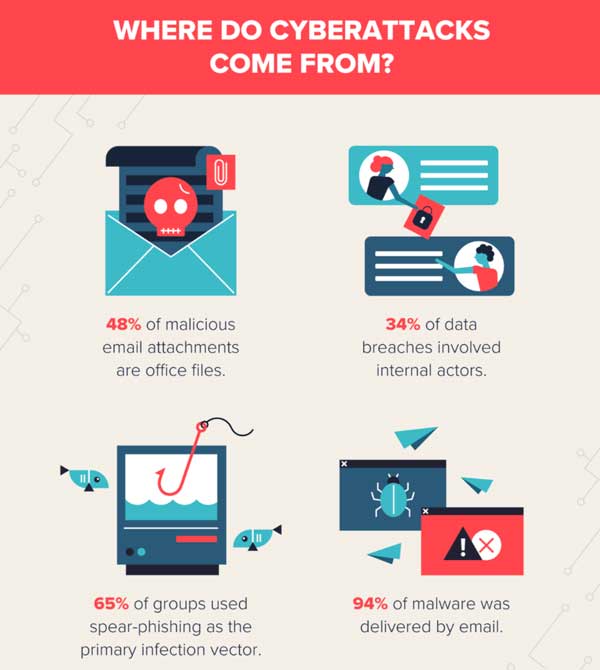As a digital marketer, you might think cybersecurity is the kind of tech stuff only the IT guys in your company have to worry about.
If that’s the case, here’s some news: Cybersecurity is everyone’s responsibility. If there’s a breach in your company’s sensitive data, claiming ignorance is not going to fix things.
There is good news, though. Protecting your team and company against the majority of cyber criminals is not difficult. In this article, we look at the five most common digital marketing areas where cybersecurity threats can be found, and how to protect yourself against them.
1. Email
Yep, email. If your marketing team spends most of its time on social media, it can be easy to forget the oldest digital communication medium is still the most dangerous. Even today, the vast majority of hacks – up to 91% – start with an email.
There are two primary threats when it comes to email. One is that your team could be sending personally or commercially sensitive data in an insecure format. In other words, not using encryption. If that’s the case, there are relatively simple encryption strategies, which marketers should be aware of and able to execute.
The second big threat is phishing. Marketing teams are a favorite target of hackers because they are keen to interact with customers – or hackers posing as customers. Teach your team how to recognize a phishing email, and you’ll go a long way towards preventing successful cyberattacks.
2. Malware
Most people are aware of the standard computer virus. But are you also aware how modern malware has evolved? Today, there’s spyware that can record your passwords and keystrokes, while ransomware encrypts a site’s sensitive data and only decrypts it when a ransom is paid.
Again, marketing teams receive a number of malware attacks, thanks to their frequent daily communication. For this reason, your marketing team needs to be smart about what they click on and add antivirus extensions on all the software they use for work.
3. WordPress
It might seem strange to give WordPress its own entry in this list, given how many systems digital marketers use on a daily basis.
However, WordPress is so dominant in the CMS market that related vulnerabilities – and even vulnerabilities in popular plugins used with the software – continue to make headlines around the world.
One of the best ways to keep your WordPress account safe against hackers is simply to update it regularly. Enable automatic updates to make sure you receive timely security patches, and regularly review the plugins and extensions you use.
Outdated plugins that are no longer supported are a major danger for organizations, so it’s a good idea to delete them and find a supported alternative. It’s also best to delete any plugins, themes, and extensions you no longer use.
4. Domain
WordPress isn’t the only web host with issues. Popular forms of attack, like Cross-Site Scripting (XSS), SQL injection, and DDoS have been on the rise in recent years, and all make use of domain-level faults in your security. These dangers are amplified if your website has multiple users, such as freelancers or consultants.
Since you’re not a cybersecurity expert, accept that you need help monitoring and protecting your domain. Ask help from your IT staff to place protective measures for cybersecurity across all the websites you own.
5. Social media
Modern marketers are well aware of how effective social marketing can be. But with great power comes great danger. Social media accounts are a favorite target of hackers, because they can cause exponentially more havoc – not just stealing personal information, but hijacking accounts to post offensive material until you pay them to stop.
This is a particular problem for marketing teams because it’s likely you have multiple members using the same social media account. Make sure all members use a password manager to keep the authentication credentials secure and unique.
Furthermore, educate your team to the danger of unsolicited social media messages. Just as hackers rely on emails to scam you into sharing sensitive information, they may also use Facebook and Instagram to attack your systems.
The bottom line
The foundational point here is that digital marketers can’t afford to ignore cybersecurity just because the word isn’t in their job description. Not only does it put your data at risk, any businesses you work with are unlikely to continue doing so if you fall victim to a hack or data breach. It’s just not worth the risk for them.
Implementing an effective cybersecurity strategy should be an integral part of your B2B marketing strategy. By showing business partners that you take your cybersec responsibilities seriously, you uphold your brand values and protect the company at the same time.
Literally raised in a barn without television in the wilds of southern Missouri, Derek Dowell is currently fascinated with digital marketing, travel technology, real estate investing, and Mountain Dew.






